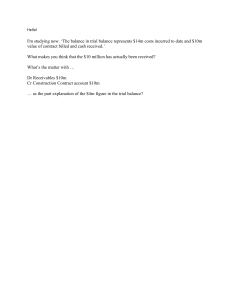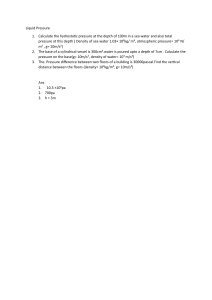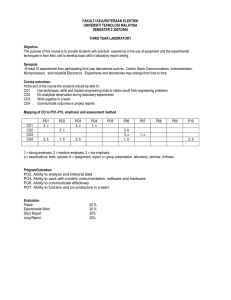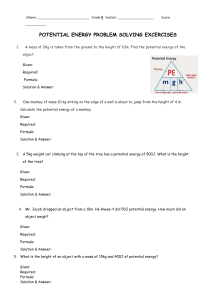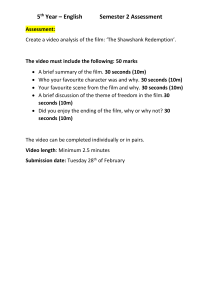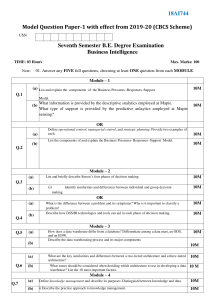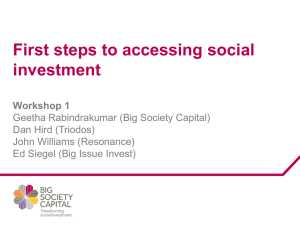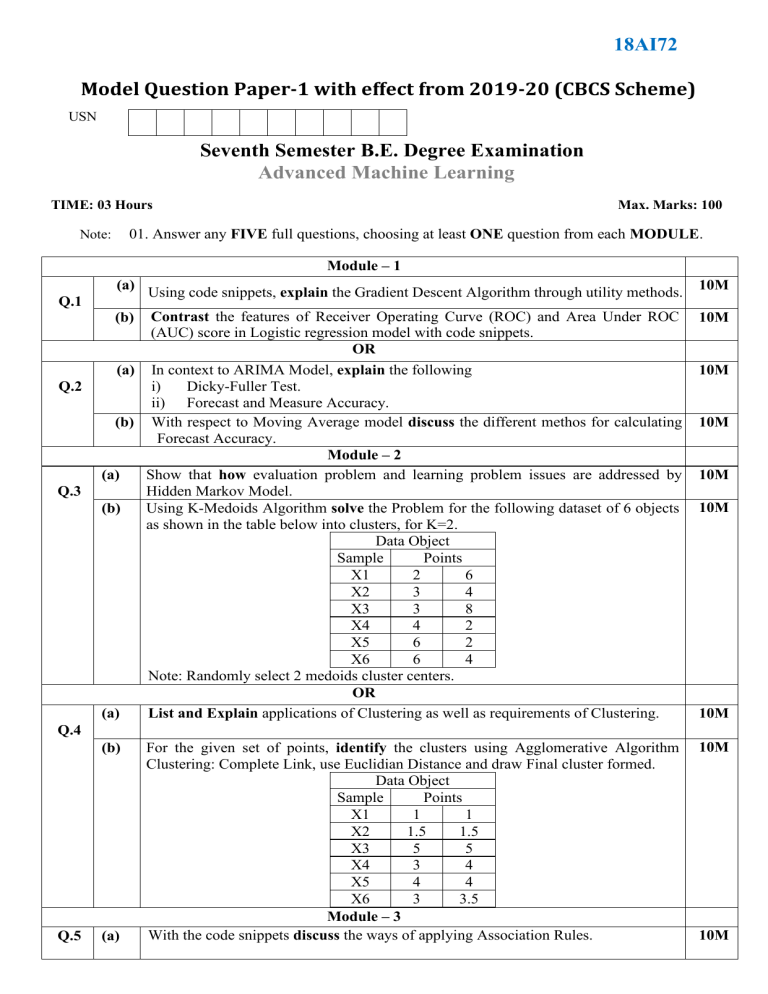
18AI72 Model Question Paper-1 with effect from 2019-20 (CBCS Scheme) USN Seventh Semester B.E. Degree Examination Advanced Machine Learning TIME: 03 Hours Max. Marks: 100 01. Answer any FIVE full questions, choosing at least ONE question from each MODULE. Note: Module – 1 (a) Q.1 Using code snippets, explain the Gradient Descent Algorithm through utility methods. Contrast the features of Receiver Operating Curve (ROC) and Area Under ROC (AUC) score in Logistic regression model with code snippets. OR (a) In context to ARIMA Model, explain the following i) Dicky-Fuller Test. ii) Forecast and Measure Accuracy. (b) With respect to Moving Average model discuss the different methos for calculating Forecast Accuracy. Module – 2 (a) Show that how evaluation problem and learning problem issues are addressed by Hidden Markov Model. (b) Using K-Medoids Algorithm solve the Problem for the following dataset of 6 objects as shown in the table below into clusters, for K=2. Data Object Sample Points X1 2 6 X2 3 4 X3 3 8 X4 4 2 X5 6 2 X6 6 4 Note: Randomly select 2 medoids cluster centers. OR List and Explain applications of Clustering as well as requirements of Clustering. (a) 10M (b) 10M (b) Q.2 Q.3 10M 10M 10M 10M 10M 10M Q.4 Q.5 (a) For the given set of points, identify the clusters using Agglomerative Algorithm Clustering: Complete Link, use Euclidian Distance and draw Final cluster formed. Data Object Sample Points X1 1 1 X2 1.5 1.5 X3 5 5 X4 3 4 X5 4 4 X6 3 3.5 Module – 3 With the code snippets discuss the ways of applying Association Rules. 10M 18AI72 Q.6 (b) Write a note on User-Based Similarity Algorithm and Finding the Best Model. 10M (a) OR List and Explain importance of words in a Bag-of-Words (BoW) Model. 10M (b) Using the code snippets discuss the challenges of text analytics. 10M (a) Q.7 (b) (c) Q.8 (a) (b) Module – 4 Explain different types of activation functions for processing a node in Neural networks. Explain the Learning process involved in the neural network that responds to a stimulus correctly. Solve XOR function using McCulloch-Pitts neuron. OR Derive the Backpropagation rule considering the training rule for Output Unit weights and Training Rule for Hidden Unit weights. Derive the Gradient Descent Rule and explain the importance of Stochastic Gradient Descent. (c) Prove the population evolution and the schema theorem incontext to genetic algorithm (a) Module – 5 Prove the K – nearest neighbor algorithm for approximating a discrete – valued function with pseudo code. Q.9 (b) (a) Q.10 (b) Suppose hypothesis h commits r = 10 errors over a sample of n = 65 independently drawn examples, then solve the following (i)What is the variance and standard deviation for number of true error rate error D (h)? (ii)What is the 90% confidence interval (two-sided) for the true error rate? (iii)What is the 95% one-sided interval (i.e., what is the upper bound U such that error D (h) ≤5 U with 95% confidence)? (iv)What is the 90% one-sided interval? 7M 5M 8M 8M 6M 6M 10M 10M OR What is reinforcement learning and develop reinforcement learning problem with neat 10M diagram. Interpret the Q function and Solve Q Learning Algorithm assuming deterministic 10M rewards and actions with an example. 18AI72 Table showing the Bloom’s Taxonomy Level, Course Outcome and Programme Outcome Question Q.1 Q.2 Q.3 Q.4 Q.5 Q.6 Q.7 Q.8 Q.9 Q.10 Bloom’s Taxonomy Level attached (a) (b) (a) (b) (a) (b) (a) (b) (a) (b) (a) (b) (a) (b) (c) (a) (b) (c) (a) (b) (a) (b) Bloom’s Taxonomy Levels L2 L2 L2 L2 L1 L3 L1 L3 L2 L2 L2 L2 L2 L2 L3 L3 L2 L3 L3 L3 L3 L3 Remembering( knowledge):𝐿𝐿 1 Analyzing (Analysis): 𝐿𝐿 4 Course Outcome CO1 CO1 CO1 CO1 CO2 CO2 CO1 CO2 CO3 CO3 CO3 CO3 CO3 CO3 CO3 CO3 CO3 CO3 CO4 CO4 CO4 CO4 Lower order thinking skills Understanding Comprehension): 𝐿𝐿 2 Higher order thinking skills Valuating (Evaluation): 𝐿𝐿 5 Programme Outcome PO1 PO1 PO2 PO2 PO3 PO3 PO3 PO3 PO3 PO4 PO5 PO6 PO9 PO12 PO5 PO6 PO9 PO9 PO9 PO4 PO5 PO12 Applying (Application): 𝐿𝐿 3 Creating (Synthesis): 𝐿𝐿 6
